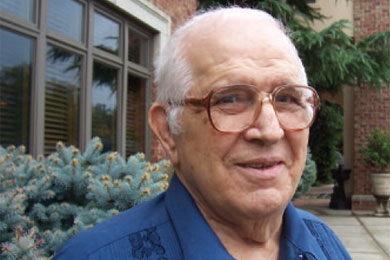In 1941, John Scigliano arrived at the University of Maryland School of Pharmacy eager to start his teaching assistantship in chemistry. He met B. Olive Cole, PhD, JD, the first female full professor at the School, who immediately informed him that the position had been filled, but that there was a job in bacteriology.
“I got an F in bacteriology,” he blurted out, “because I got a sty.”
His undergraduate bacteriology professor at Creighton University had announced that students who became infected with the bacteria they were studying would fail. Scigliano, who chalked up an A-plus the second semester of bacteriology, grabbed Cole’s offer.
“Every time you go down the road, there’s a little bump and you overcome it,” he says. Scigliano, PhD ’50, MS ’44, has overcome his share of bumps in an impressive pharmaceutical career.
A native of Omaha, Neb., and the first in his family to go to college, Scigliano arrived in Baltimore with no credit card or checking account and $18 to his name. The first month’s rent took $16, leaving him with $2 to live on.
In those days, labs stocked milk, potatoes, and bouillon and sugar for preparing media. Until his first paycheck, Scigliano survived for one month on milk, boiled potatoes, and bouillon. When Cole, who would later become interim dean, found out, she invited Scigliano to breakfast every morning in her home. They were neighbors.
Eventually, he replaced the lab materials used for food. And then he went on to overcome some more “bumps.”
After earning his master’s degree in bacteriology in 1944, Scigliano joined the US Navy. In 1950, after earning his PhD in pharmacy (analytical chemistry) from the School, he became the first pharmacist with a PhD recruited by the US Public Health Service (USPHS).
During his 32-year career with the US Navy and USPHS, Scigliano conducted research for various branches of the National Institutes of Health. His entry rank was lieutenant senior and at retirement he was a Navy captain.
He pioneered new drugs to treat heart, cancer, mental health, and periodontal problems. He also designed ophthalmic preparations and established standards for pharmaceuticals, as well as for quality control and stability of drugs.
A significant part of his career was dedicated to researching the pharmacology, safety, and therapeutic potential of drugs of abuse, principally LSD and marijuana. For his career accomplishments in public health, he received the USPHS Meritorious Service Award in 1973.
Scigliano attributes much of his motivation to succeed to family. He was inspired by his mother, who made sandwiches for the occasional hobos who would come by his house; by his grandmother, a midwife and holistic healer; and his father, a laborer who taught him that “work is the bread of life.” He credits his wife, Alice, a 1945 graduate of the University of Maryland School of Nursing, for her unstinting encouragement.
He is grateful to Gustav Cwalina, PhD, his undergraduate chemistry professor, for inspiring him and recommending him for the research scholarship.
Now 88, Scigliano finds pleasure in woodworking, gardening, and exercising on the treadmill. A modest man, he is reluctant to discuss his achievements. When pressed, he will quietly concede, “I have an internal feeling that I’ve accomplished something good.”
In September 2006 he established the Dr. John A. Scigliano Scholarship Fund to support third- or fourth-year School of Pharmacy students pursuing advanced degrees with an interest in public health or research. The scholarship is dedicated to the USPHS.
He also honored his late wife by establishing the Alice Catherine Horine Scigliano Scholarship Fund at the School of Nursing in 2005.
“I wanted to pay back the University for my education through the graduate assistantship. The University of Maryland made me what I am,” he says.
Recalling his early days as a graduate student at Maryland, Scigliano would like to help other students and offers some advice: “When you find a bump in the road, stop, examine, and proceed. Don’t get discouraged, and never abandon your pursuit.”

